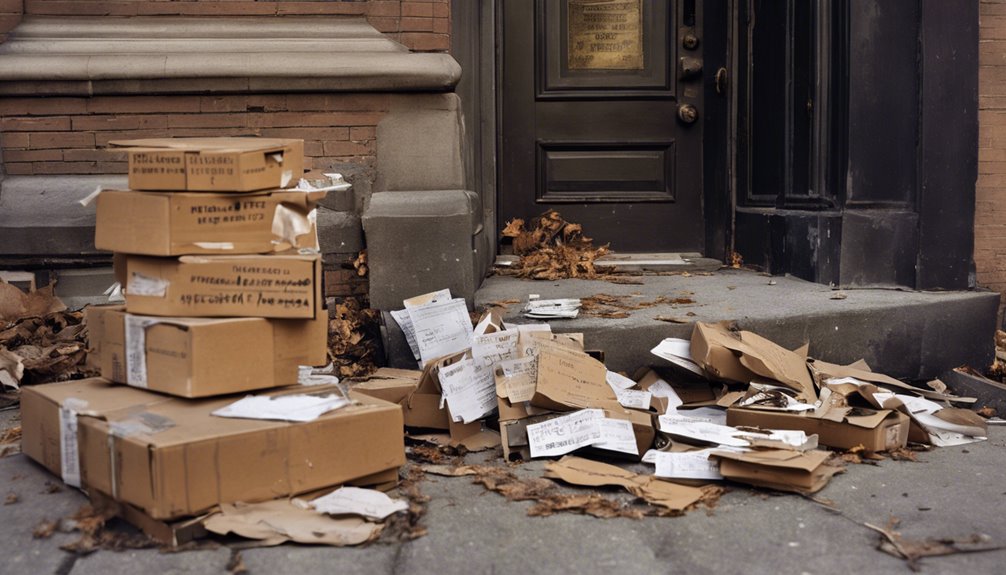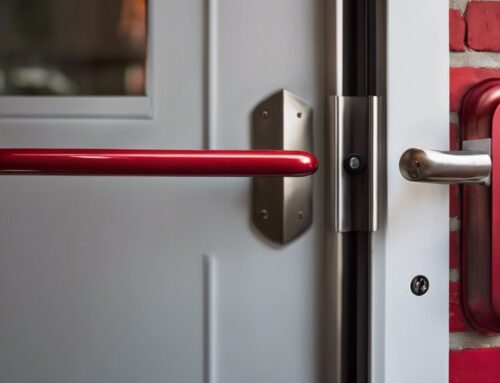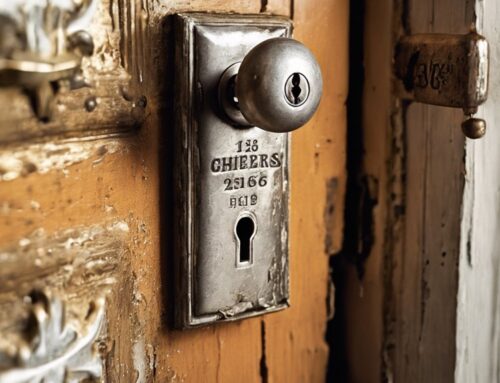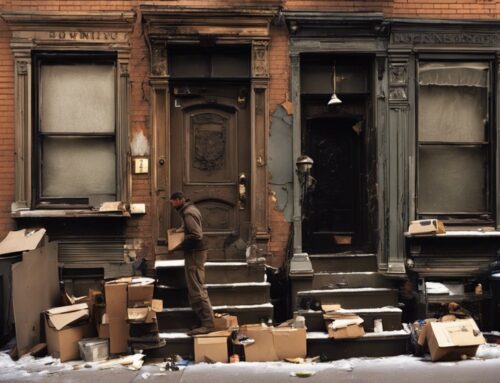You might be surprised to learn that in New York, only court-approved processes can lawfully authorize lock changes after an eviction. Many landlords mistakenly believe they can take matters into their own hands, but doing so could lead to serious legal repercussions. Understanding the proper protocols not only protects landlords from potential misdemeanor charges but also safeguards tenant rights during evictions. It raises significant questions about responsibilities and consequences, making it essential for both parties to know the law. Isn't it time to clarify what actually happens after a court issues an eviction order?
Key Takeaways
- Only a court can authorize any lock changes after an eviction is executed.
- Landlords must obtain a Warrant of Eviction before proceeding with lock changes.
- Law enforcement officials are responsible for executing eviction and changing locks legally.
- Self-help lock changes by landlords are illegal and can result in misdemeanor charges.
- Compliance with state lock picking laws is essential after obtaining eviction authorization.
Authority for Lock Changes

When it comes to changing locks after an eviction, it's important to understand that only a court can authorize this action. As a landlord, you must first take your tenant to court and obtain a judgment against them. The court plays a significant role, determining the legitimacy of the eviction and issuing the necessary orders that allow you to proceed. Additionally, the involvement of locksmiths during evictions is crucial to ensure that the process adheres to legal protocols.
After securing a judgment, you can't simply change the locks yourself. Only law enforcement, such as a Marshal, Sheriff, or Constable, has the authority to execute an eviction and change locks. They're required to serve a 14-day Notice of Eviction following the court ruling, guaranteeing that the process is formal and legally sound. It is essential to comply with the Housing Stability and Tenant Protection Act to ensure that all eviction measures follow the law.
It is crucial to recognize that any self-help measures, such as changing locks or shutting off utilities, are illegal. You must refrain from taking the law into your own hands, as doing so can lead to serious legal repercussions. Violating these eviction laws can result in a Class A misdemeanor, along with civil penalties ranging from $1,000 to $10,000 for each violation.
Liability doesn't rest solely on you; any agents or representatives assisting in illegal eviction actions share that responsibility.
If you find yourself in a situation involving illegal lockouts, tenants can contact law enforcement or an attorney to seek recourse. Knowing your rights and obligations in this process guarantees that you maintain both legal and ethical standards.
Understanding Illegal Lockouts
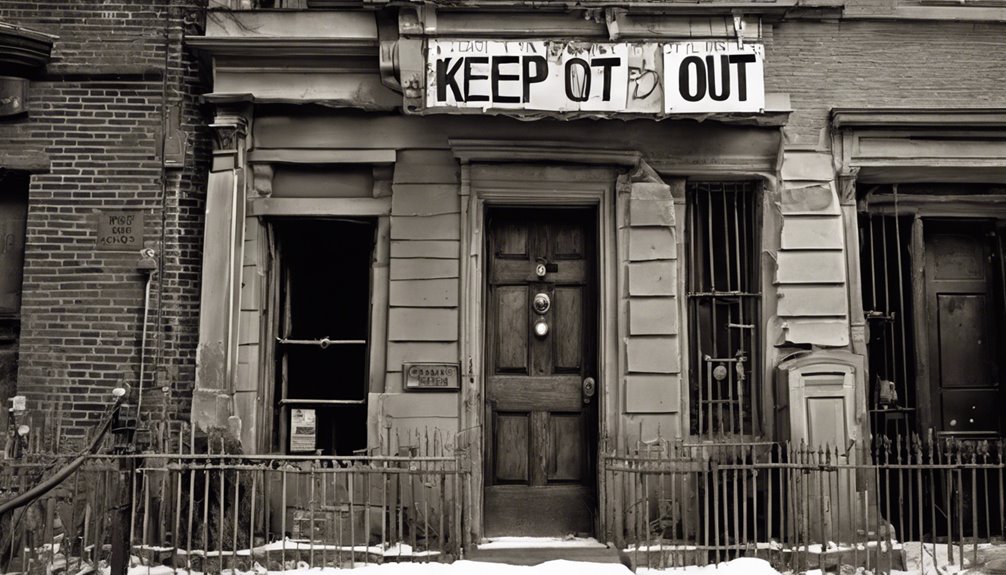
Understanding illegal lockouts is essential for both landlords and tenants, especially after discussing the legal protocols for lock changes post-eviction.
An illegal lockout occurs when a landlord changes locks without a court order, uses threats or violence, or cuts off essential services like heat and hot water. Other forms include physically removing tenants or their belongings and even removing the front door. Landlords who engage in illegal lockouts face severe legal consequences. They can be charged with a Class A misdemeanor, which can lead to up to a year in prison and fines of $1,000 or double the profit gained unlawfully. Each violation incurs civil penalties from $1,000 to $10,000, along with daily fines of $100 for failure to restore a tenant upon request. Legal statutes regarding illegal lockouts protect tenants from such actions by landlords, and the penalties can also escalate for landlords who operate their businesses without a proper license.
If you're a tenant facing an illegal lockout, you have rights and options. First, contact law enforcement to help you regain access. Be sure to request a report documenting the incident. Tenants may claim triple damages for unlawful eviction, which can serve as an additional motivator for landlords to adhere to legal eviction protocols.
You can also file an illegal lockout petition in housing court to compel the landlord to allow reentry. Keep all relevant documents like leases and utility bills to establish your lawful tenancy.
Tenant Rights Against Eviction
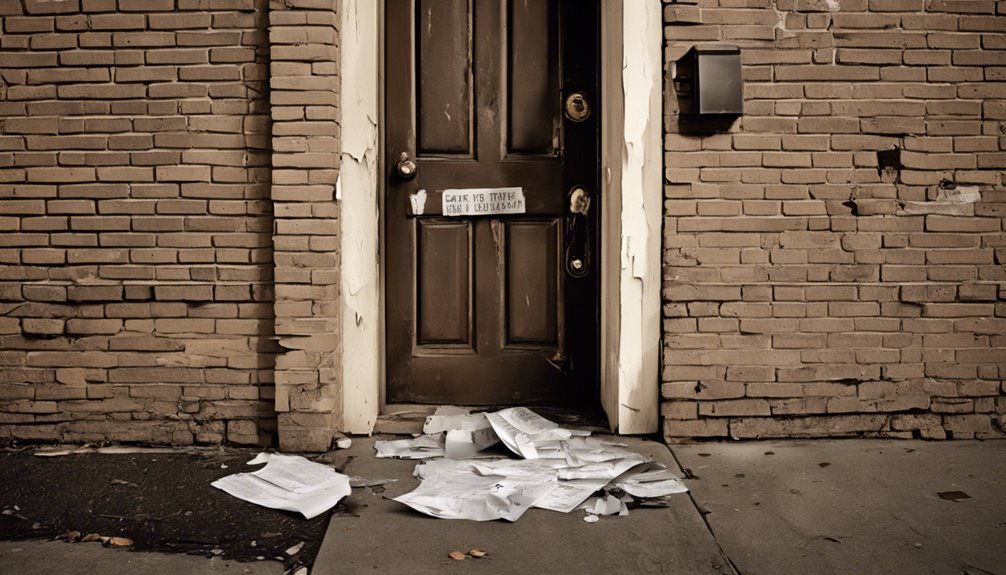
Although you may feel overwhelmed by the eviction process, it's crucial to know your rights as a tenant. You're protected from discriminatory evictions, which means landlords can't evict you based on race, religion, gender, national origin, familial status, or disability. New York law also safeguards against bias related to age, sexual orientation, and military status, thanks to the Fair Housing Act. Violations of these protections can lead to significant penalties for landlords.
Locksmiths must be aware of their responsibilities regarding legal protocols during eviction situations to avoid potential liability.
If you're a low-income tenant, you have the right to free legal representation, which can greatly increase your chances of staying in your home. Even if you don't qualify for free services, other resources are available to help you navigate your situation. Familiarizing yourself with Article 7 of the Real Property Actions and Proceedings Law can empower you throughout the process. Having a lawyer can bolster your defense against eviction, especially since many tenants may be unaware of their specific employment rights under New York law.
Remember that landlords must follow specific legal procedures for eviction, and any failure to do so could work in your favor. You can challenge the eviction by pointing out procedural defects, such as a lack of proper notice. Additionally, minor lease breaches may not justify eviction. Your security deposit can potentially cover any rent owed, sparing you from eviction altogether.
Under the "Good Cause Eviction Law," landlords can't arbitrarily refuse to renew your lease or increase your rent without good cause. This guarantees you have stability in your living situation and the right to challenge unjust actions in court.
Court Process for Evictions
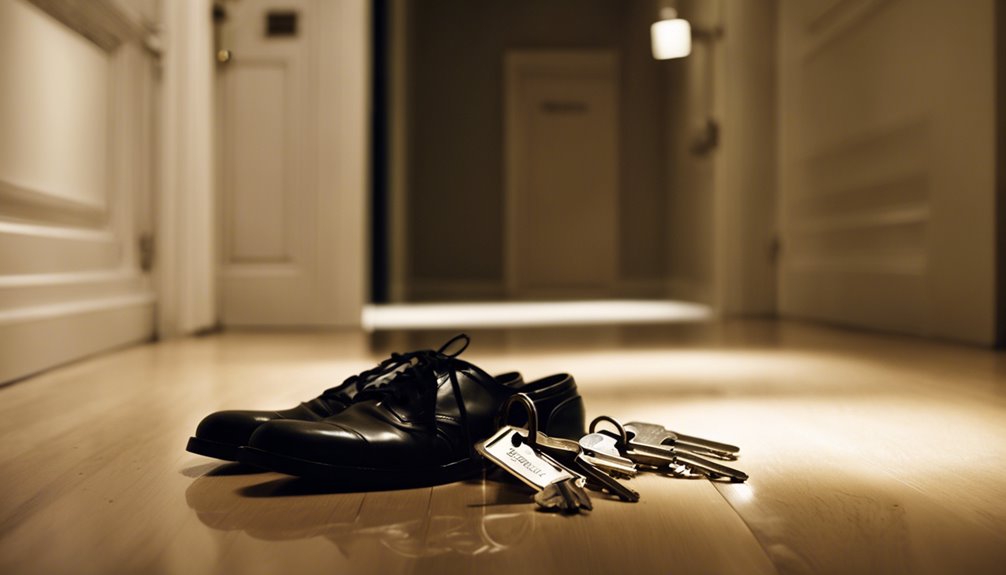
When facing an eviction, it's essential to understand the court process, starting with the required notice to the tenant.
If the notice goes unanswered, you'll need to file an eviction petition with the appropriate court, ensuring all documents are correctly served. It's worth considering that some landlords opt for rekeying locks to maintain security after a tenant has been evicted.
During the court hearing, both you and the tenant will present your cases, and the judge will decide based on the evidence provided. It's also important to remember that following the eviction process, landlords must comply with legal responsibilities for master key systems to ensure security in the newly vacant property.
Notice Requirements Overview
Evicting a tenant involves specific notice requirements that must be met to guarantee compliance with legal protocols. Depending on the reason for eviction, different types of notices apply.
For non-payment of rent, you need to provide a 14-day notice to pay or quit. For lease violations, a 10-day notice to cure or quit is necessary. If you're terminating a month-to-month tenancy, you'll issue either a 30-day or 60-day notice.
Each notice must clearly state the reason for eviction and specify how long the tenant has to remedy the situation. You also need to express your intent to file for eviction if the issue isn't resolved. Additionally, you must consider that using lock bumping tools without permission could lead to legal issues during the eviction process.
Serving the notice must be done formally, either through certified mail or personal delivery. And remember to keep proof of service, as it may be required later in court.
You must wait for the specified notice period to expire before you can file for eviction. In nonpayment cases, you can initiate a nonpayment proceeding in Housing Court three days after the notice was served or an oral demand was made. Additionally, it's crucial to understand that lock picking laws vary by state and may impact how quickly you can change locks post-eviction.
Following these protocols helps assure a smoother eviction process.
Filing Eviction Petitions
Once you've met the notice requirements, it's time to file your eviction petition. You'll need to determine the appropriate court jurisdiction for your case. In New York City, you'll file with the Housing Court, while outside the city, it varies by local City, Village, Town Court. Here's a quick overview of the filing requirements:
| Aspect | Description | Notes |
|---|---|---|
| Required Documents | Petition, Notice of Petition, and supporting proofs | Most need notarization |
| Filing Fees | Fees vary by court and case type | Check local regulations |
| Service Timeline | Serve documents 10 to 17 days before the hearing | Use a process server or eligible person |
After you file your eviction petition, the court sets a hearing date. Don't forget to arrange for the documents to be served on your tenant; this is essential for the process. Finally, you'll need to file an Affidavit of Service as proof of serving the documents. Adhering to these guidelines will streamline your eviction process, ensuring your rights as a landlord are upheld efficiently. Additionally, it's crucial for locksmiths performing lock changes post-eviction to comply with the SAFE Act as it regulates locksmith practices in New York.
Court Hearings Explained
Court hearings play an essential role in the eviction process, as they provide a structured environment for landlords and tenants to present their cases.
Initially, you'll receive a Notice of Petition from the court, detailing when and where your hearing will occur. It's vital to attend, as failing to do so may lead to a default judgment in favor of the landlord.
During the hearing, you can file an answer, presenting any defenses or counterclaims you may have. In nonpayment cases, remember that you can prevent an eviction by paying the full amount due before the hearing.
Both you and the landlord will present evidence and witnesses to support your claims. If the judge rules against you, a judgment will be entered, potentially including costs and rent owed.
Should you need more time, you can request an adjournment, but be mindful that the court may limit this.
After a judgment in favor of the landlord, they must secure a Warrant of Eviction before proceeding. Be aware that you'll receive a 14-day notice to vacate, and a sheriff will carry out the eviction if necessary.
Understanding this process helps protect your rights.
Consequences of Illegal Evictions
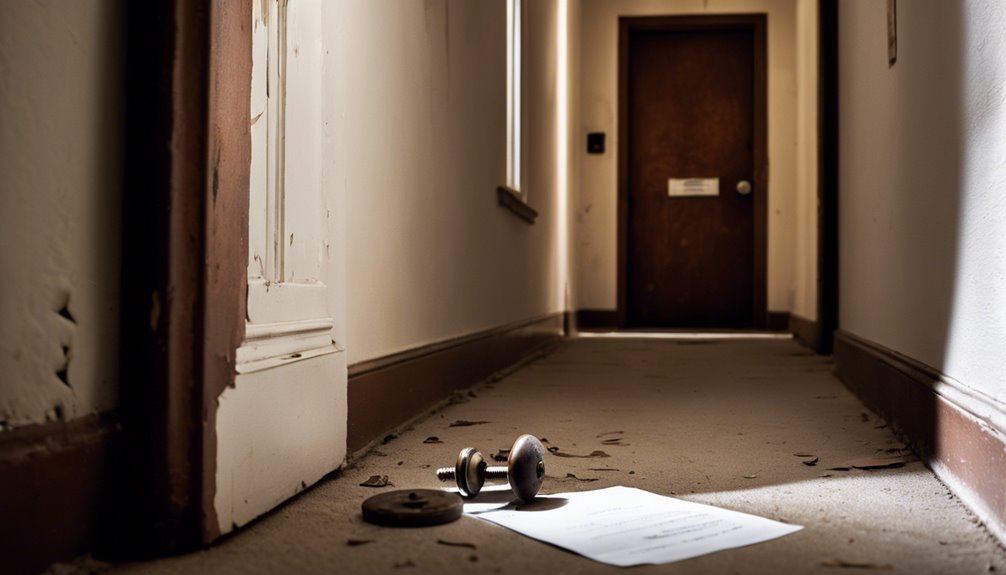
While many landlords may not fully understand the ramifications, the consequences of illegal evictions can be severe. Engaging in illegal eviction is classified as a Class "A" misdemeanor. This means you could face up to one year in jail, and penalties might include probation or time served. Each instance of unlawful conduct counts as a distinct offense, allowing for multiple charges if you repeatedly violate tenant rights.
In addition to criminal penalties, you could face hefty civil fines ranging from $1,000 to $10,000 for each violation. Not only does each violation constitute a separate offense with its own penalty, but you could also incur daily fines of up to $100 if you fail to restore the premises to its original condition. These penalties can stack up quickly, especially if you terminate essential services like power or water.
Prohibited actions—such as using force to evict a tenant, cutting off utilities, or harassing them—are all pathways to facing criminal charges. If found liable, you could be held accountable in both civil and criminal courts under New York City and state laws.
To prevent these costly repercussions, it's crucial to follow proper legal protocols for eviction. Understanding your responsibilities and adhering to the law will help you avoid jail time, financial penalties, and ongoing legal trouble.
Ultimately, respecting tenant rights promotes a more peaceful and favorable rental environment.
Reporting Illegal Lockouts
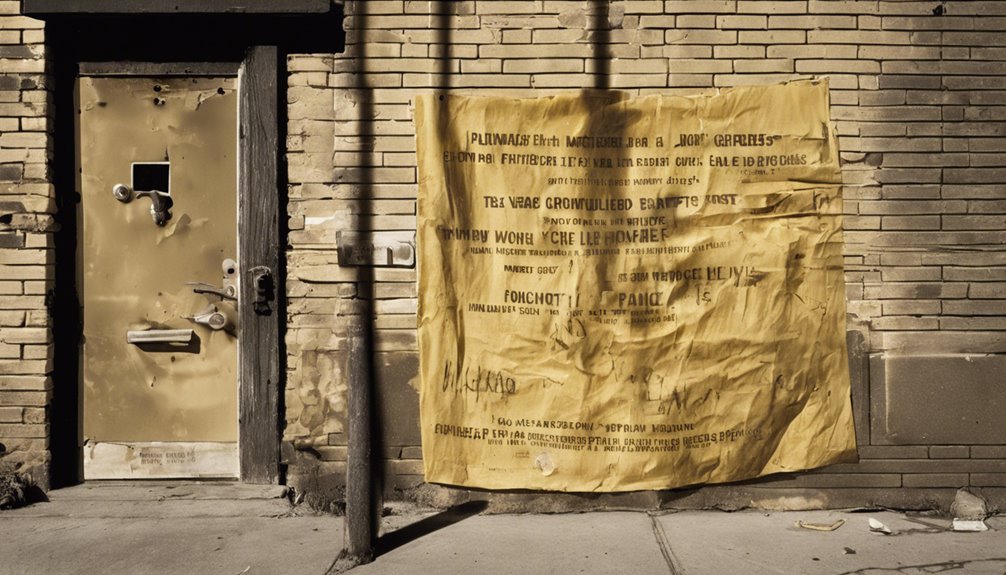
Have you found yourself locked out of your home without a court order? This situation can feel overwhelming, but you have legal protections. If you suspect an illegal lockout, it's vital to take immediate action. Here's what you should do:
- Contact law enforcement to report the lockout.
- Provide evidence of your lawful tenancy, like your written lease, proof of rent payments, or utility bills.
- Ask law enforcement to restore your tenancy if the eviction was unlawful.
- Document your interactions with law enforcement, noting names and badge numbers.
- Follow up with the Sheriff's Office if police don't assist, or ask to speak to a supervisor.
Remember, protections extend to tenants, roommates, family members, and workers who've inhabited the premises for 30 days or more. Officers are responsible for determining the legality of the eviction. They should help maintain peace but won't execute eviction warrants.
If law enforcement verifies that the lockout violated the law, they should help restore you to your home.
Be aware of the urgency of the situation—swift action is critical to guarantee your rights are protected.
Reporting illegal lockouts is your right, and taking the necessary steps can safeguard your freedom and housing stability. Stay assertive, and don't hesitate to demand your legal protections.
Resources for Tenant Assistance

When facing housing challenges, knowing where to find help is vital.
Local tenant helplines can connect you with essential resources, while legal aid services offer guidance on your rights.
Additionally, court assistance programs provide support throughout the eviction process, ensuring you have access to the help you need.
Local Tenant Helplines
If you're facing issues related to eviction or unsafe living conditions, local tenant helplines offer essential support to navigate these challenges.
Launched on July 17, 2023, by the Mayor's Public Engagement Unit, these helplines replaced the old voicemail system with live operators who are ready to assist you.
Here's a quick overview of what these helplines can do for you:
- Advise on rent payments, leases, evictions, and harassment.
- Connect you with city programs like SNAP and Cash Assistance.
- Help you apply for state programs such as rent relief and unemployment insurance.
- Guarantee faster response times through dedicated staff.
- Support you with over 100,000 calls handled since 2020.
You can reach out to the PEU Tenant Helpline during specific hours: Monday, Wednesday, and Friday.
The Met Council on Housing hotline is also available at 212-979-0611.
These resources exist to empower you, guaranteeing you have the support you need to reclaim your living situation and peace of mind.
Don't hesitate to use these invaluable tools for assistance.
Legal Aid Services
Facing eviction or other housing challenges can feel overwhelming, but legal aid services are available to support you. They're designed to provide critical assistance, no matter where you're located, whether in New York City or outside of it. Here's an overview of what's available:
| Service Type | Description |
|---|---|
| Legal Advice | Guidance on your rights and options in housing situations. |
| Representation in Housing Court | Legal support when facing eviction proceedings. |
| Tenant/Landlord Mediation | Facilitation of discussions to reach mutually agreeable terms. |
| Rental Assistance Linkages | Connections to financial resources to help maintain tenancy. |
| Assistance with Lease Issues | Help with lease violations and non-payment cases. |
Eligibility typically includes low-income status or facing eviction, with some services extending beyond NYC's boundaries. Providers like the Legal Aid Society and various local organizations can help you navigate complex legal landscapes. Don't hesitate to reach out for free representation or legal advice—your housing stability matters. Access to these services can equip you with the tools needed to maintain your home and promote your freedom from eviction.
Court Assistance Programs
Many tenants encounter challenges maneuvering the court system during eviction processes, but various Court Assistance Programs are available to help. These programs aim to empower you with the resources you need to prevent eviction and understand your rights.
Here are some options for assistance:
- BronxWorks: Supports low-income Bronx residents, especially the elderly, in traversing housing court.
- Emergency Rental Assistance: Provides funds for back rent and utility assistance to avert eviction.
- Homebase Program: Focuses on preventing homelessness within specific Bronx service areas.
- Legal Services and Mediation: Offers counseling and mediation to resolve tenant-landlord disputes.
- Tenant Rights Education: Teaches you about your legal rights and the eviction process.
Most programs cater to those with incomes below 200% of the federal poverty limit, making them accessible to a significant number of tenants.
If you're facing eviction or need support, don't hesitate to reach out to these organizations. They're dedicated to helping you reclaim your situation and secure your rights, ensuring you don't have to navigate this difficult process alone.
Your freedom starts with informed choices and the right resources.
Legal Obligations for Landlords
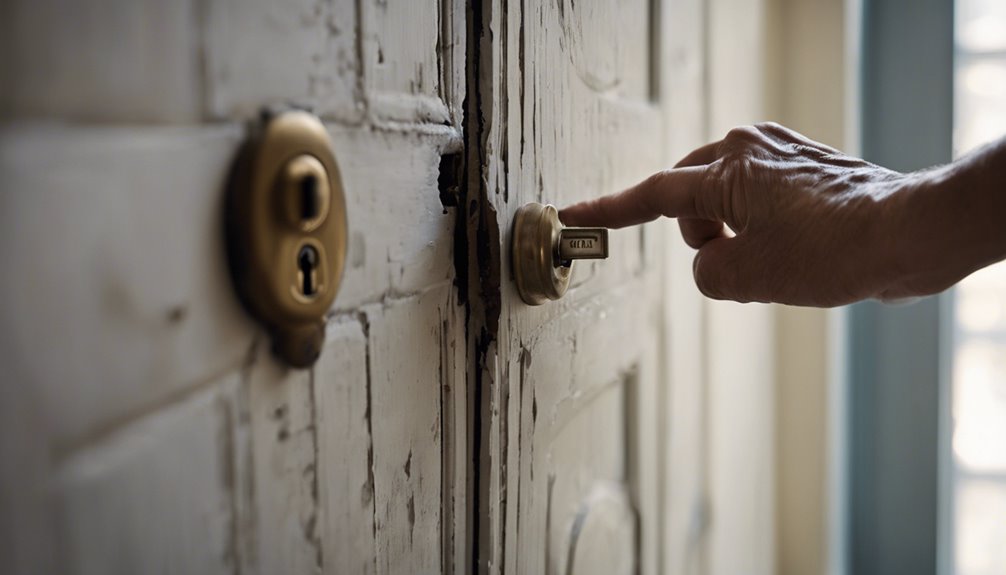
While managing rental properties, landlords have specific legal obligations that must be adhered to in order to secure a lawful eviction process.
First, you must provide written notice before initiating any eviction. The type of notice depends on the reason for the eviction, whether it's non-payment or a lease violation. For late rent, you need to send a notice after rent is over five days late, followed by a 14-day notice demanding payment or vacation of the premises.
Next, you need to follow proper court procedures. After giving notice, you can file for eviction through the court system, guaranteeing you outline the reason for eviction clearly. The court will then give you a notice with the court date.
Remember, any eviction procedures must comply with legal standards; failure to do so can render the eviction invalid.
It's also essential to avoid illegal eviction methods. Changing locks without providing a key or using threats can lead to severe penalties, including civil fines ranging from $1,000 to $10,000. Such actions are classified as illegal evictions and may expose you to criminal charges.
Finally, keep in mind that tenants with 30 days or more of occupancy enjoy specific protections against unlawful evictions. Always stay informed about tenant rights and secure compliance to safeguard your interests as a landlord.
Frequently Asked Questions
How Can a Tenant Prove Illegal Eviction Occurred?
To prove illegal eviction, gather evidence showcasing your occupancy. This includes your lease, proof of rent payments, and recent mail with your address.
Document any actions taken by the landlord, like changing locks or removing your belongings. If you experienced threats or utility shutoffs, note those incidents as well.
Collect all communication related to your rental agreement. This thorough evidence will support your claim and help establish that an illegal eviction occurred.
What Should I Do if My Landlord Changes Locks Without Notice?
If your landlord has decided to change the locks without a word, it's crucial to act quickly.
First, document the situation thoroughly, capturing any evidence of your tenancy.
Reach out to the NYPD to report this unexpected change and consider calling the Tenant Helpline at 311 for assistance.
This situation could fall under illegal practices, so consulting a lawyer could provide you with the guidance needed to reclaim your peace and stability.
Can Tenants Retrieve Their Possessions After an Unlawful Eviction?
Yes, you can retrieve your possessions after an unlawful eviction.
First, you'll want to request restoration to your home, as that's your right. Once you're back in, you can collect your belongings.
If your landlord disposed of your items, you might consider pursuing civil action for recovery.
Law enforcement can assist you in accessing your home and possessions, ensuring your rights are protected throughout the process.
Don't hesitate to seek legal help if needed.
Are There Exceptions to the 14-Day Notice Requirement?
When you're sailing through stormy waters, knowing the rules can be your lifeline.
Unfortunately, there aren't any exceptions to the 14-day notice requirement in nonpayment cases; it's a hard rule.
For mobile home park evictions, different timelines exist—30 days for nonpayment and 90 for holdover cases.
How Can I Document My Communication With My Landlord Regarding Eviction?
To document your communication with your landlord regarding eviction, keep a detailed log of all interactions.
Note dates, times, and the content of each conversation, whether it's in-person, via email, or through letters. Save copies of any written communication and take notes on phone calls.
If the landlord provides any verbal agreements or notices, write those down immediately for your records.
This documentation can be essential if disputes arise later.
Conclusion
In New York, it's ironic that landlords, aiming to reclaim their properties, risk criminal charges by acting illegally. While the law provides a clear process for lock changes post-eviction, some still choose the path of self-help, often facing dire consequences. Remember, your rights as a tenant are protected, and there's a system in place to guarantee fairness. So, next time you find yourself locked out, take a moment to appreciate the irony of the laws meant to safeguard you.

